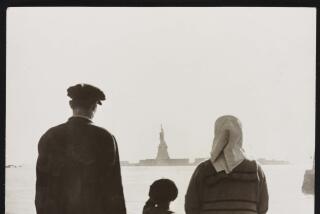TV REVIEW : A Thought-Provoking Six-Part ‘America’s Century’ on PBS
- Share via
If you’ve ever known the feeling of returning to an old house you thought you knew, only to experience it again as if for the first time, then watching “America’s Century” (at 10 tonight on Channel 28) will bring that feeling back. One of writer-host Lewis Lapham’s points in this six-part series is that the United States needs to retrieve its own history and, with it, a sober sense of its position in the world.
It took the British (Panoptic Productions and Channel 4) to produce one of the most remarkable contributions to that cause ever shown on television.
Since the death of Edward Abbey, Lapham is arguably this country’s most brilliant essayist, holding forth each month in the magazine he edits, Harper’s. He is almost alone among commentators in rising above ideological niches, establishing a firmly personal and informed view that combines a more soulful version of Henry Kissinger’s Realpolitik with a less caustic version of Gore Vidal’s anti-imperialism. Like an intellectual alley cat, he slips through the 20th Century’s violent darkness, making his mark before it’s registered in the mind.
To write fine essays is one thing; to blend the essay’s economy and depth with the powerful iconography of newsreel footage is another. Producer-directors Susan Crowther and Peter Bate, combining old film and new interviews with a wide range of American observers, have managed to put Lapham’s ideas into high relief.
In the first two episodes screened for review, “Coming of Age” and “Familiar Enemies,” the overwhelming sense is of an innocent United States, adolescent of mind yet adult in economic capacity. Teddy Roosevelt leads the charge everywhere: San Juan Hill, the Philippines, anywhere the Navy can travel. Millions flee Europe for a big land where they can start a new life. The Old World burns, and the New World resembles a big toy store.
Then, like a nightmare after a long slumber, World War I, the Depression and Hitler rumble in, with a brief pause for Calvin Coolidge and the Jazz Age. And, with our new global role, the Republic gained its own tragic figures, like that sublimely stunted idealist, Woodrow Wilson. Watching this, you have to pinch yourself: This is one great story.
Like all great stories, Lapham’s is full of contradictions and absurdities, such as the images of American troops traipsing across the Russian snow, trying to defeat the newly victorious Bolsheviks. Or the innocent faces of German youth, which so resemble their American counterparts, singing “Our Hitler Is Our Lord” in a prim classroom. Or the attempts by the media to depict the murderous Stalin to the American public as a father figure.
The archival achievement here cannot be overemphasized. Film footage of Lenin and Stalin speaking in Red Square, of passengers leaping like ants off of luxury vessels hit by German U-boats, of Nikita Khrushchev watching Shirley MacLaine perform “Can-Can,” almost threaten to drown Lapham’s extraordinary narration.
But not narration like this, on U.S. foreign policy in the early part of the century: “Nobody entertained the image of overseas American empire. Among the privileged and well-educated classes, a few very polite gentlemen entertained an eccentric interest in diplomacy. But, for the most part, they were amateurs, the kind of people who joined the State Department in order to spare their mothers the indignity of a baggage search when passing through foreign customs.”
Finally, “America’s Century,” though a powerful critique of U.S. global reach, adopts no political line. It can’t, when the interview subjects run the gamut from George McGovern to Milton Friedman, from Hamilton Fish to Gen. Curtis LeMay. There is no substitute for reading, but to miss “America’s Century” is to miss a piece of history.
More to Read
The complete guide to home viewing
Get Screen Gab for everything about the TV shows and streaming movies everyone’s talking about.
You may occasionally receive promotional content from the Los Angeles Times.






